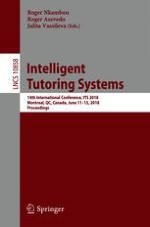2018 | OriginalPaper | Buchkapitel
Analysis of Permanence Time in Emotional States: A Case Study Using Educational Software
verfasst von : Helena Reis, Danilo Alvares, Patricia Jaques, Seiji Isotani
Erschienen in: Intelligent Tutoring Systems
Aktivieren Sie unsere intelligente Suche, um passende Fachinhalte oder Patente zu finden.
Wählen Sie Textabschnitte aus um mit Künstlicher Intelligenz passenden Patente zu finden. powered by
Markieren Sie Textabschnitte, um KI-gestützt weitere passende Inhalte zu finden. powered by
